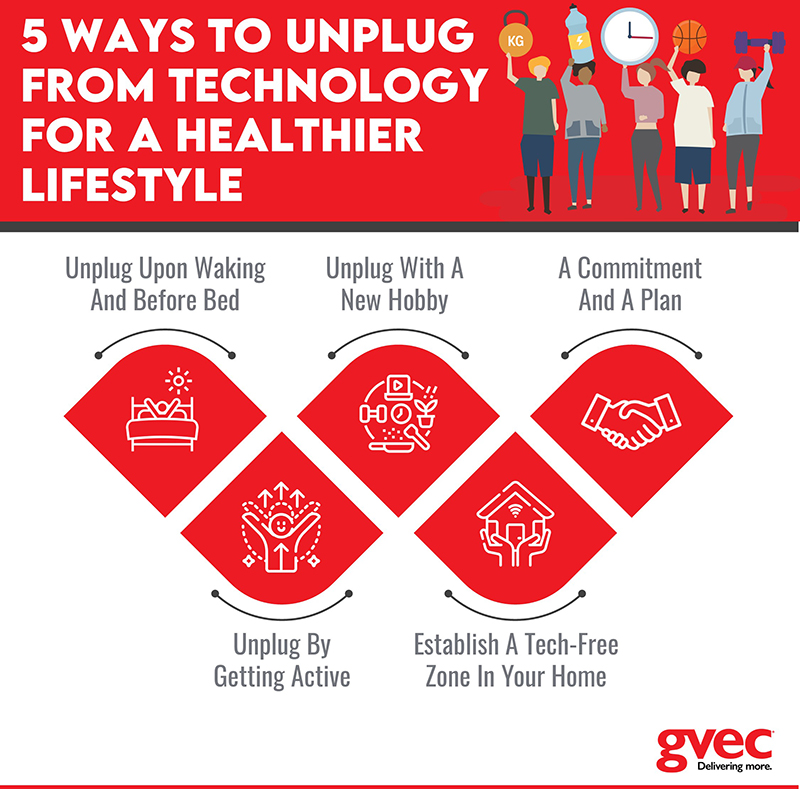Updated: March 25, 2024
Technology—especially internet-connected devices—has become part of our modern way of life. Many Americans spend each day’s first few and then final minutes connected to the internet and glancing at a screen. And of course, we spend countless hours in between, at work or play, connecting, tapping, clicking, liking, organizing, typing, crunching, calculating, conferencing, chatting, streaming.
Living in a Tech-Driven World
Like all good things, too much connected time is, well…too much, and can be unhealthy, contributing to insomnia, impaired social relationships (the real-life kind), decreased work/life productivity and more. To help counter this trend of “over connectedness,” this month we’re offering five tips for helping log off from the internet and unplug from technology in general.

One [Small] Step At A Time
You probably didn’t develop your technology habits overnight. Most people probably won’t be able to change their routines in a day, either.
We think a good way to begin to unplug from technology is doing so a little at a time. Start by taking a small increment of time—say, 15 minutes—and dedicate it to being completely disconnected—no internet, smartphone or watch, no tablet, desktop, laptop, or gaming machine.
Unless you feel ready, you don’t need to make that 15-minute block a daily priority, either. Instead, unplug from technology a little at a time by starting with just one or two 15-minute sessions a week. Develop a routine, and add more days as you feel comfortable.
Unplug From Technology Upon Waking And Before Bed
Do you feel like you can’t fall asleep at night without one last check of social media, one last post, like, or comment? Do you reach for your phone first thing in the morning? If so, it might be time to rethink your before-bed habits and morning-time routine.
Part of the problem lies in the fact that, for most people, a smartphone isn’t just for calling, texting, web browsing, and checking social media and email. Most of us use our phones as an alarm clock, too, and even as a means of reading a book before falling asleep. This fact makes checking social media or emails too easy and irresistible.
Consider banishing your smartphone from the bedroom. Set a dependable routine for yourself for doing your last online business of the day before shutting down and leaving your phone in a room other than the one where you sleep.
But what about an alarm clock? How will you get out of bed each morning? Consider going old school and buying a standalone alarm clock (yes, they still sell those). Or maybe you’ve got an old one somewhere in a closet. Instead of reading a book from your phone before falling asleep, consider going back to hardcopy books, enjoyed in the light of a bedside lamp. Yes, e-readers are nice, but in truth, these amount to just one more connected, lighted screen. To truly unplug from technology, we suggest banishing all electronic screens from the bedroom.
Unplug From Technology By Getting Active
Regular exercise is one of the best things a person can do for overall physical, mental and emotional health. If you’re not already engaged in a regular workout routine, we suggest starting one that’s free of online distractions. Fitness classes are a great way to accomplish this goal; taking up yoga is another. If you’re already physically active, try banishing all email, social media and web browsing from your routine (if you don’t already, of course).
Unplug from Technology With A New Hobby
In this age of hyper-connectedness, it’s easy to forget there are still many available hobbies that don’t require an internet connection or an electronic device.

Do you have a “green thumb?” Do you have a general interest in plants? Gardening can be another great pursuit for not only reducing screen time but also for helping you spend more time outdoors. Cooking is another great option. Many people find cooking extremely relaxing and love to experiment with various ingredients and styles.
Finally, do you enjoy playing card games? Maybe boardgames? Checkers? Chess? If so, consider starting a game night with friends and/or family. We suggest arranging a block of time weekly, bi-weekly, or monthly for yourself and friends and/or family to spend time just playing games and enjoying each other’s company. If possible, make your game-playing get-togethers official Unplug from Technology events by establishing a rule that everyone must leave electronic devices at home or turn them off at the door.
Establish A Tech-Free Zone In Your Home

A Commitment And A Plan
It all sounds pretty simple, right? As with any potentially unhealthy habit, though, cutting back on connected/technology time can be easier said than done. However, if you’re willing to make a serious commitment and develop a plan, you’ll have a much greater chance of success. We offer this blog as a possible starting point.

